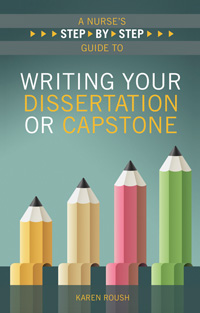| Why write?
Nurse stories are about life—its messiness and its truths.
|
| By Karen Roush |
 Why write? is a question that often comes up in my work of mentoring nurses in writing. The question doesn’t arise as often with faculty members, who are expected to disseminate research findings and are required to publish to get tenure. Nor does it come up with nurses working in the policy arena, who understand the necessity of writing to create change and promote a health care agenda. But nurses working as clinicians don’t see writing as integral to what they do.
While it’s true that you can provide
excellent clinical care without ever publishing an article, writing
will enrich your practice, enhance your experience, and create more
positive outcomes for your patients. If writing isn’t part of your
nursing life, I encourage you to start. And if it is, I encourage you to
expand your writing, try a different genre, reach a new audience, or
consider a new purpose.
 Write to improve patient care. Write to improve patient care.
Nurses do amazing work. We conduct
research, develop innovative approaches to care, and carry out
quality-improvement projects that change outcomes and make a real
difference in patients’ lives. We need to share with other nurses and
health care professionals what we observe and learn in our work, and
writing is the best way to do that. When you solve a problem, discover
previously unseen connections, or find a better way to care for
patients, writing enables you to disseminate your knowledge beyond the
bedside for the benefit of many.
For example, take a
quality-improvement project you’ve completed on your unit that has
resulted in positive outcomes for your patients. Perhaps they are better
able to self-manage their diabetes or are more prepared for a complex
surgery, resulting in less fear preoperatively and improved pain
management postoperatively. Talking to co-workers spreads the
information within your unit or to the wider facility. Presenting at a
conference shares it with a few hundred or even a thousand attendees.
But publishing has the potential to spread the information to thousands
of nurses across the country and around the world. And that means your
efforts to improve care for a few will benefit an untold number of
patients.
Write to bear witness.
As nurses, we are present at the
most profound events—from the beginning of life to the end of life and
everything in between. We are there with the mother who hears her baby’s
first cries, and we are there with the mother whose baby is born in
awful silence. We are there with the patient who awakens from surgery to
hear his or her prognosis, and we are there as that patient figures out
what that prognosis means. We are there when patients recently diagnosed with diabetes realize that, yes, they can administer their own insulin—they’re going to be all right, after all.
Sharing these stories offers meaning
and insight to other nurses and those who experience situations similar
to what we write about. These stories ease suffering and provide paths
to new perspectives that help people heal. When people recognize
themselves in stories, they realize they are not alone, that others have
been where they are and have made it through. Through that recognition,
they may come to a place where they are able to say: “I will be OK. I
will get through this, too.”
Write to share your own stories.
When we write about our own
experiences, we communicate the unique perspectives of two worlds—the
world of the healer and the world of the sufferer. We cannot separate
our stories from what we’ve learned and lived as nurses. When our
personal stories are embedded in that knowledge, they gain power and
have potential to be transformative.
I am a survivor of intimate partner
violence (IPV) and, as a nurse, have cared for many patients who have
experienced IPV. Writing as both a survivor and nurse gives a weight to
what I write that neither perspective alone would have. It engenders
trust and credibility and, therefore, creates an opportunity and—I
believe—a responsibility to share my personal story for the possibility
of change.
Recently, I visited a class of
graduate students to talk about writing. They had been assigned to read
some of the pieces I’ve written about IPV over the years, including
opinion pieces, blog posts, poems, and research findings. The responses
of two students illustrate the impact writing can have.
The first confessed that, when she
saw the topic of the reading assignments, she was not happy. “I thought,
‘Oh no, this is going to be such a downer.’” But the insights she
gained from reading about IPV in those formats—stories, poems, and
opinion pieces—made her realize how little understanding she had of the experience
of IPV and how her misconceptions had resulted in her providing poor
care to women who suffered from it. She was determined to change her
practice.
The second student was a woman who
was in an undergraduate class I had visited a few years earlier, a class
that also had read some of my writing on the subject of IPV. Now, in
this graduate-level class, she asked if she could read something she had
written. It was a personal essay about reading my stories and how it
had given her courage to finally speak about her own experiences as a
survivor of IPV. Through writing, she was able to break through the
silence and isolation and begin to heal. These two examples illustrate
the tremendous power of writing to transform lives, professionally and
personally.
Write to tell the stories of others.
Nurses have a long history of
speaking up for the vulnerable and the voiceless, beginning with
Florence Nightingale, a prolific writer, and onward to nurses such as
Lillian Wald, the great pioneer and champion of public health nursing.
Wald published a series of articles in The Atlantic Monthly that later evolved into her book, The House on Henry Street.
In the articles and the book, she told stories of the poor and
disenfranchised that she and her organization of nurses cared for, a
population of new immigrants to the city who were unable to speak for
themselves.
As Wald writes in The House on Henry Street, “Conditions such as these were allowed because people did not know,
and for me there was a challenge to know and to tell” (p. 8, italics
original). Writing is the best way to tell—not only because, as noted
above, it can potentially reach so many, but because it endures.
Speaking about a story or a project resonates in the moment, but writing
can resonate through time. A hundred years after she wrote them,
Lillian Wald’s words enhance our understanding of social injustice and
move us to do something about the injustices we see today.
Write to understand.
Writing forces us to see gaps in our
thinking. We cannot write well about a topic unless we understand it
completely. When we see gaps, two things may happen: 1) We go out and
seek more information, which may cause us to question preconceived
ideas, change perceptions, and open ourselves to discovery of new ideas,
or 2) we begin to formulate questions that will guide research to help
fill the information gaps. Eventually, writing leads to new
understanding, not only for ourselves but for other nurses and health
care professionals.
 Writing
also helps us make sense of this world of health and illness, trauma
and redemption that we inhabit. We are called upon day after day to deal
efficiently and logically with suffering, to apply science and
rationality to the irrational. Moving quickly through a morass of tubes
and wires, we combine numbers and evidence with the subjectivity of the
life in front of us. Amongst all the equipment, diagnostics, and data,
writing keeps us connected to humanity. It helps us interpret and
analyze our actions and reactions. It helps us see some small part of
ourselves in our patients and, as a result, to be that much more
empathetic and to go back the next day and do it all again. Maybe
better. Writing
also helps us make sense of this world of health and illness, trauma
and redemption that we inhabit. We are called upon day after day to deal
efficiently and logically with suffering, to apply science and
rationality to the irrational. Moving quickly through a morass of tubes
and wires, we combine numbers and evidence with the subjectivity of the
life in front of us. Amongst all the equipment, diagnostics, and data,
writing keeps us connected to humanity. It helps us interpret and
analyze our actions and reactions. It helps us see some small part of
ourselves in our patients and, as a result, to be that much more
empathetic and to go back the next day and do it all again. Maybe
better.
So, why write?
Our experiences as nurses—our
stories—are about life, all of its confused messiness as well as its
transcendent truths. Few other professions put members in the thick of
it like nursing does. When we write about it, we make connections,
improve care, and transform lives. Isn’t that the very essence of what
nursing is? RNL
Karen Roush, PhD, APN, assistant professor of nursing at Lehman College in the Bronx, New York, USA, is the author of A Nurse’s Step-by-Step Guide to Writing Your Dissertation or Capstone. Roush served for many years as editorial director and clinical managing editor for the American Journal of Nursing (AJN) and continues her affiliation with the journal as an editorial consultant. The founder of The Scholar’s Voice,
established to help professionals and scholars in the health sciences,
particularly nurses, become skilled, confident writers, Roush blogs
regularly for AJN’s “Off the Charts” and advocates against gender-based violence by writing and speaking on the topic.
|
Welcome to my blog! Ask questions. Share your successes. Move forward toward your health care goals!
Thursday, July 23, 2015
Why write? Nurse stories are about life—its messiness and its truths.
Subscribe to:
Post Comments (Atom)
No comments:
Post a Comment